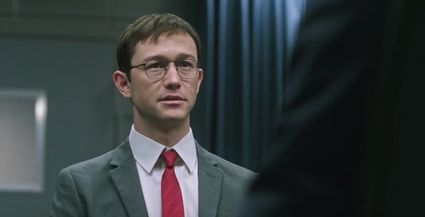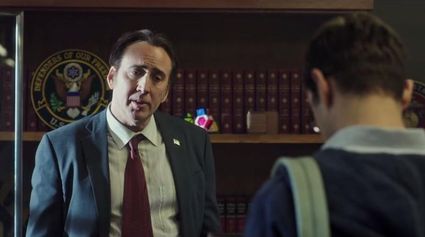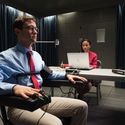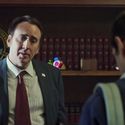MOVIE REVIEW: SNOWDEN
October 6, 2016
We all know the name Edward Snowden. A former CIA employee and contractor to various U.S. government agencies and its sub-contractors, Snowden turned the world upside down in May 2013 when he leaked classified information to journalists, Glenn Greenwald and Ewan MacAskill, and documentarian Laura Poitras, exposing the high level of global surveillance being perpetrated by the NSA and others with the knowledge and support of the United States and European governments. During a "covert" operation in Hong Kong, Snowden handed over the "illegally obtained" information to Poitras and Greenwald with MacAskill subsequently brought into the mix, following which it began to go public in The Guardian and the Washington Post, followed by The New York times and other publications and news agencies. Poitras filmed the Hong Kong events which led to her Oscar winning documentary "Citizenfour", giving the world some insight into Edward Snowden but more importantly, insight into what was happening in our world. By June 2013, the U.S. Department of Justice filed charges against Snowden under the Espionage Act of 1917, alleging multiple violations of the Act and theft of government property. After multiple attempts at obtaining asylum somewhere in the world, Snowden ultimately landed in Russia, where he remains to this day.
But looming questions still remain unanswered in these passing years. Who is Edward Snowden? Where does he come from? What prompted him to "go rogue" and steal classified information and disseminate it to the world? What makes him tick? And why 2013? Controversial to say the least, whether you call Snowden a patriot, a dissident, a whistleblower or a traitor, people are intrigued by the man and his methods. So leave it to Oliver Stone to deliver just that with SNOWDEN.
A fascinating and compelling film, with SNOWDEN Stone creates a comprehensive and cogent look at Edward Snowden the man; taking us through his background, showing us personal moments and key individuals and events that shaped the man the world ultimately met in 2013. Humanizing Edward Snowden not only through story construct, but thanks to an award-worthy performance by Joseph Gordon-Levitt as Snowden, Stone together with co-writer Kieran Fitzgerald draws on the books, "The Snowden Files" by Luke Harding, and ""Time of the Octopus" by Anatoly Kucherena, plus nine trips to Moscow with lengthy meetings and interviews with Snowden himself, pulls back the curtain on Snowden's personal life taking us from Snowden as a dutiful son in a family with generations of military service to perhaps being the greatest treasonist in the history of the United States. To describe SNOWDEN as riveting is an understatement.
SNOWDEN is without a doubt the most complete picture we've seen of the Snowden story since those fateful days in Hong Kong when all of the "stolen" information was released to the world. While the acclaimed Poitras documentary focuses on those eight days in Hong Kong and not on painting a portrait of Snowden, Stone artfully bookends in SNOWDEN with the idea of "pressure points"; pressure points within the intelligence community and what Edward Snowden's own "pressure point" was that led to his decision to go rogue. The story construct that leads to answering THAT question is key to this film. No one but Oliver Stone could make this film.
Taking us back to 2004 in Ft. Benning in Columbus, Georgia when Snowden was attempting to join Special Forces with a goal of serving in Iraq, we start to see what makes Snowden tick; how internalized he is, how quietly self-absorbed he is, his ego, and we finally have a starting point for the wheels to start turning, giving the world an understanding and unfolding clarity of what promulgated Snowden's personal trajectory and the events as they ultimately played out. Unfortunately, this serves as one of the murkiest points in the film given Snowden allegedly did no basic training and sidestepped protocol jumping into Special Forces training. (Of course, undisputed is that in less than four months, Snowden was discharged from the Army after having broken his legs during a training exercise.)
Jumping around the world as Snowden takes various jobs in various countries, story and visuals meld with visualizations often relied upon to show us what is happening in this world of cyber intelligence. Talking about his reliance on visualizations, Oliver Stone is quick to note, "The NSA work can be very dull. It's often just a grey box in a closet with AT&T connections. It's not really that glamorous. We had to walk the line, thread the needle. You don't want to go too far, but you want to give it a little juice. You don't want to make it silly. It's not silly." Noteworthy is that Stone focuses more on individuals, key moments, key observations and trigger words and conversations that contribute to Snowden's psychological development.
There has never been an Oliver Stone film where casting of the titular character was as important as it is with SNOWDEN. Joseph Gordon-Levitt humanizes Snowden, makes him relatable to the "common man" with insecurities, uncertainties and paranoias just like everyone else. BUT, what JGL also does is strip away the camera facade that we have now seen ad nauseum over the past three years. Beyond the physical similarities between Snowden and JGL, Gordon-Levitt also worked with his own vocal intonations so as to achieve Snowden's own lockjaw type manner of speaking. As a result, JGL achieves a distinctive voice and voice pattern that is so unique, one can't help but listen. You will find yourself doing an auditory double-take. For a man of little words to have a voice so unique, makes you sit up and take notice.
Adding texture and depth to SNOWDEN and his journey to disclosure is a bit more insight into girlfriend Lindsay Mills. While we get the sense that the liberal Mills may indeed have been the catalyst in altering Snowden's blind faith loyalty to the United States, despite her lobbying directly to Oliver Stone to cast her as Mills, casting Shailene Woodley may have been a misstep. Although competent enough as an actress, there is no chemistry between Woodley and JGL, and her performance feels empty thanks to a lack of development of the character on the page. Knowing what Woodley can do with a dramatic role as she did in "White Bird In A Blizzard", seeing what she doesn't get to bring to the party here is disappointing.
Adding in all the major players in the Snowden timeline adds fascinating shading, creating a true metaphoric sense of the vastness of the grey area in surveillance and cyber warfare. A composite of NSA whistleblowers William Binney and Thomas Drake, as crazed CIA computer geek Hank Forrester who was relegated to "the basement" because of telling the truth, Nic Cage brings an unbridled internal enthusiasm to the performance we have rarely seen in him the past few years. Albeit minimal screen time, Cage's Forrester is important to the psychological development of the SNOWDEN timeline and "pressure point" build up for Snowden's actions.
Tom Wilkinson's Ewan MacAskill brings seasoned and tempered wisdom into the picture, serving as a terrific counter to Zachary Quinto's over-zealous egomaniacal Glenn Greenwald. Have to admit though, for anyone who has seen the "Citizenfour" documentary, Quinto captures Greenwald's self-aggrandizing brashness to a tee. The stunner of SNOWDEN is Rhys Ifans as CIA director Corbin O'Brian. Mind-blowing performance not only thanks to his chameleonic appearance, but with the evil undertones that permeate every word he utters. Similarly, Timothy Olyphant as CIA Agent Geneva oozes slime.
As Laura Poitras, Melissa Leo is a better Laura Poitras than Poitras herself, as she brings a maternal instinct to the character. Notable is that Stone and Fitzgerald use that aspect of Leo's nature in the third act, serving as the final link that leads us to learning Snowden's "pressure point". Not to be overlooked is Scott Eastwood as Trevor James, Snowden's boss at the NSA surveillance facility in Hawaii from where Snowden "stole" the classified materials and then fled the country. As comes as no surprise, Eastwood has a youthful patriotic energy that borders on freneticism, which works well in the bunker-style work situation. Standout are Ben Schnetzer and Lakeith Stanfield as Snowden's work associates, Gabriel Sol and Patrick Haynes, respectively. Schnetzer's Haynes is someone who pops up in the first act, setting the stage for Snowden's initial exposure to "hacking" and surveillance, and it bodes well for story to have him back with the two reconnecting for the climactic third act. Stanfield however commands the screen with a quiet intelligence that begs to be seen more. Although limited, nice to see Parker Sawyers as an unnamed CIA interviewer peppering JGL's SNOWDEN; perfect timing, and a bit ironic, given Sawyers current role as Barack Obama in "Southside With You".
Technically, the film sings. I had no doubt that it would given Anthony Dod Mantle as cinematographer. Shooting digitally, which is a first for Stone with a narrative film, Arriflex cameras were used, both 4K and an experimental 6K. The use of light, color, framing/dutching, and windows/mirrors not only builds tension, but metaphorically speaks to the issues of secrecy and Snowden's own confusion and ultimate clarity.
Maintaining a story balance without casting any judgments is one of the most surprising aspects of SNOWDEN and opens the door for discussion and insight into the basic question - Can we find a balance to our country's defense with the fundamental rights of its citizens? Once again, Stone delivers another eye-opening and thought provoking film.
Directed by Oliver Stone
Written by Oliver Stone and Kieran Fitzgerald based on "The Snowden Files" by Luke Harding, and ""Time of the Octopus" by Anatoly Kucherena
Cast: Joseph Gordon-Levitt, Shailene Woodley, Zachary Quinto, Melissa Leo, Tom Wilkinson, Nicolas Cage, Scott Eastwood, Timothy Olyphant, Lakeith Stanfield, Ben Schnetzer
BONUS: OLIVER STONE ON SNOWDEN
During the recent press day for SNOWDEN, I had a chance to speak with Oliver Stone and ask him about several aspects of the film. Here are some excerpts of what he had to say:
DLE: In light of the Espionage Act and the current charges that are pending against Snowden, did you have your hands tied at all in constructing this story and what you could and could not include and then visually show?
OS: "Very good question. Certainly, you have to analyze it. . .I think here I am constrained by reality. We had two books. We had the Russian fiction book and we had The Guardian book. We could have pursued the fictional course. It would have been okay because he was in Russia, he could have been pursued by assassins, this and that, avoided it. Or, I thought at one point we could have sent him back to the United States and he could hide. That would be very clever. There's a lot of ways you can take this story. But we didn't because we got to know him. I made three visits in the early part from January to May of 2014, after being wary of this story . I didn't want to get involved in something overly controversial that could backfire in my face. . .I didn't want to get into a mess and not make a movie after a year of work again. Anyway, I got involved. He would tell us only certain things. He can't talk about other things. But he often suggested ways to do it, and ideas. Very interesting young man.
"The idea when Kieran Fitzgerald and I wrote the first draft was, let's stay with two storylines. Let's stick to Hong Kong because that is a pressure point, as you say. . .Snowden brought us the evidence. The evidence. And you can't deny it. It's so thick this evidence; they've only released 10% of it. But I'm saying it's so thick that people don't even understand the implications of what he released. Not only is it about mass surveillance, not only illegal mass surveillance, unconstitutional mass surveillance, but it's also about cyber warfare. . . [T]he world is much more dangerous as a result of our stupidity. You have to read into it, but that's what Snowden was talking about. And in the movie, too. This is a very dangerous game. Last week we got hacked. The US got hacked. The NSA. Which means everything they stole from you, everything they know about you is now known by whoever the f**k it is who hacked the NSA. I love it! It's crazy time. They cannot provide your security. They cannot protect you. This is the thing most people don't know in the United States."
DLE: Oliver, you are a devotee of film as a director. You always shoot on film. This is the first time you have shot a film, but for your documentaries, entirely digitally and with Anthony "Dod" Mantle. Did that impact how you approached shooting?
OS: "It's a new technology. It seems to work. Anthony Dod Mantle. I really wanted to work with him for years. I've been offering him stuff. Finally got him. . .But we had a very limited budget. He wanted to work with a 65mm camera which is much more expensive, actually. Thank God we were in Munich because that's the headquarters of Arriflex. We worked out an arrangement where we did it experimentally on the basis with Arriflex so it minimized our costs. I like the look. It allows you such a strong resolution. It's a great looking film. Also, the projection of digital is so much better. When you [have] film, you have to go to every theatre and you see how it's shown. It's so sloppy the way we show film. There's no standard. And I'm still having some of that problem with digital because they lower the sound in theatres. This is a very quiet film. It was mixed very rationally. We didn't exaggerate it like "Suicide Club" and all these films that come out with action. We made it very real, a real mix. But we're gonna have to go out and fight for it.
DLE: And as for shooting digitally?
OS: "I did seven documentaries but this was a much bigger deal. More cables. It's fine. It didn't slow me down. On the contrary, you can keep shooting. But I'm not the type to shoot a lot anyway. I hate that. I don't believe in this 'let the camera run crap'. I think then you have to look at it and it just takes so much longer to edit. You have to be careful. I've always been economical."

























Reader Comments(0)